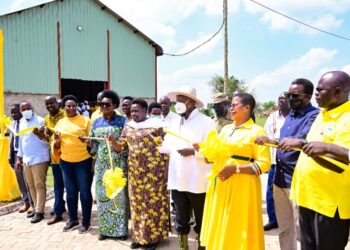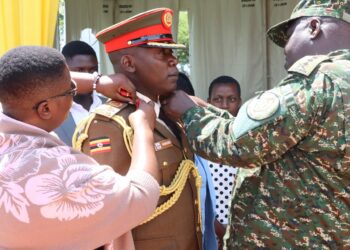South Sudan President Salva Kiir has fired his long-time army chief, Paul Malong. The move follows a number of resignations by senior generals who claimed the South Sudan Army was involved in ethnic cleansing and war crimes. It’s not clear if Malong will be appointed to another position.
The president appointed General James Ajong as the new army chief. A brief presidential decree that aired on state television Tuesday did not explain President Kiir’s decision to replace Malong.
South Sudan has been entangled in a civil war ever since a power struggle erupted in late 2013 between Kiir, an ethnic Dinka, and his deputy, Riek Machar, a Nuer. The struggle evolved into deadly fighting in the capital, Juba, that quickly spread across the country.
The violence has led to famine in parts of the country, hyperinflation, and a loss of basic services. It also has forced at least 3 million people to flee their homes. Fighting in many areas has escalated since July, when a new wave of deadly violence broke out in Juba.
Eyewitnesses told South Sudan in Focus Tuesday that 27 people were killed and more than 35 others wounded in inter-communal fighting in Gogrial state over the past four days. They said members of the Apuk and Aguok communities clashed over their shared border. Local activist Simon Machuor, who chairs the Gogrial Youth Union, said the proliferation of arms among civilians has led to deadly conflicts.
“That fight of yesterday caused a lot of casualties because many houses were burned from both sides and also we lost so many lives,” said Machuor.
Gogrial State Information Minister Ariech Mayar Ariech confirmed the fighting, but said three people died.
“The government deployed forces there between these communities; they have managed to disperse those criminals and they ran away in disarray and the situation is now under control,” said Mayar.
Machuor said the government failed to intervene while the two communities fought for days. He urged the government to deploy national troops so peace is restored.
Minister Ariech noted the two communities for several years have attacked each other in cattle raids, which he said have become more deadly in recent years because more civilians have guns.
Ariech accused officials from both communities of arming civilians.
“There is too much hatred among themselves. Maybe one of the communities between these two claims the land from other community. And the other community is disputing that idea that they are occupying the land of the other community illegally,” said Ariech.
William Manybur, a youth leader from the Apuok community, recommended new state officials for both areas, adding, “people are dying now so there must be a change to the leadership.”
Yei residents say suspected government forces killed at least seven people in Yei River state’s Yei county in two separate incidents this week. They accused government soldiers of randomly shooting at civilians in a market.
The first incident occurred in Payawa, several kilometers from Yei town along the Yei-Kaya Road, according to residents. A relative one of the victims who declined to be identified for his safety said government soldiers went on a rampage.
“The market was attacked; four of them were killed. The dead bodies were burned in a hut. So it’s just a tragic moment and a sad moment for us.”
The relative of the deceased said no one is investigating the killings. He said his relative was shot and killed while on his way to ask for permission from authorities in Payawa to transport honey outside the area.
Residents say other suspected government soldiers attacked civilians yesterday in Otogo county.
An eyewitness who prefers to be identified only as “Lodinya” for security reasons survived the attack some 22 kilometers from Yei town. Lodinya said he saw soldiers kill a 60-year-old unarmed man.
“So they went there, scared the people, the people were dispersed, left everything in the market. They shot three people, everything has been looted. Those items left in the market were collected. We know they are national army,” said Lodinya.
He urged United Nations peacekeepers to intervene in South Sudan, saying, “they only concentrate in the towns, leaving soldiers deployed in rural areas to kill indiscriminately.”
SPLA Deputy Spokesman Colonel Santo Domic denies government forces killed civilians in Yei County, saying the SPLA was deployed in the area to protect civilians, not hurt them.
“The SPLA does not attack civilians. Because even by common sense, how does SPLA move with all the military arsenal to attack civilians who have got no weapon? This is just a political campaign to tarnish the image of the SPLA before the international community,” Domic told South Sudan in Focus.
Source: www.voanews.com
Do you have a story in your community or an opinion to share with us: Email us at editorial@watchdoguganda.com











